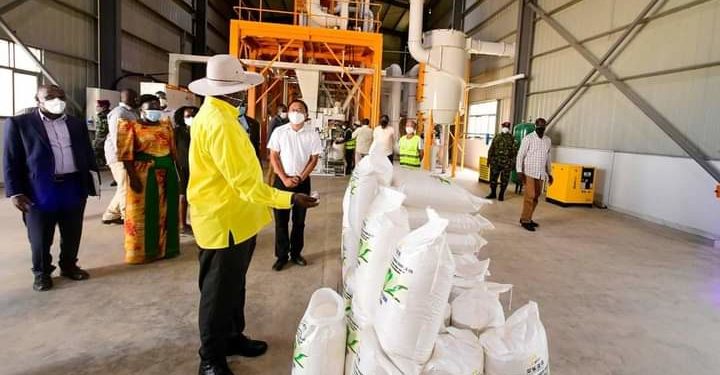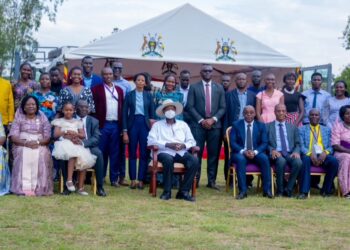When Idi Amin left in 1979, a leadership vacuum emerged which increased the level of insecurity, weakening all attempts at economic reform and reconstruction by the three governments that ruled Uganda between 1979 and 1980. Obote reclaimed power in 1980 and attempted a recovery programme to raise GDP growth, reduce inflation and revive production.
Using the dual foreign exchange rate system, he devalued the shilling and floated it, increased agricultural produce prices and attempted to reform the monetary and fiscal policy. However, the economic reforms introduced were as short-lived as his government. After 1983, Obote abandoned the recovery programme and engaged in expansionist fiscal and monetary policies that led to resurgence of inflation and a drastic fall in GDP growth. He printed a lot of money to finance the budget deficits, leading to hyperinflation. For example, money supply increased by 127% in 1984, accelerating inflation by 140% between January 1984 and January 1985.
The Obote government also failed to keep within set expenditure limits. For example, in 1984 alone, there was a four-fold increase in public-sector wages, financed by domestic borrowing from banks and the central bank. Domestic borrowing increased by 70% in 1984.20 Foreign exchange controls were tightened in 1985, as arms purchases competed with consumer imports. By the time Obote was toppled by the military in July 1985, Ugandans were living agonising lives.
Economy in free fall
During the brief regime of Tito Okello Lutwa in 1985, the economy slipped out of control. Lutwa’s reign saw GDP fall by 5.5% (that is, instead of growing, Uganda’s GDP declined by 5.5%). The period beginning mid-1984 and January 1986 marked a steep deterioration in Uganda’s economic performance. The looting and general insecurity that accompanied the fall of Obote led to shortages of consumer goods and fuel. The rural economy was devastated and the whole economy went into a free fall. Therefore, when NRM came to power in 1986, it inherited a country and an economy in ruins.
The colonial (enclave) economy had been destroyed by Amin and Obote and completely finished off during the six months of Lutwa’s leadership. Inflation had reached 240% by the time NRM took power in January 1986, while GDP growth had declined to 0.3%, itself being driven by the subsistence sector. 21 GDP per capita growth was negative. For example, in 1984 per capita income fell by -3.49% and the shrinking of incomes worsened to -6.47% in 1985. 22 Life expectancy for Ugandans had reduced to 48 years.
Secure your future
This is the reason Ugandans should always be very careful when scrutinising the credentials of individuals popping up to lead our country. Beginning in 1987, NRM instituted economic reforms to pull the country out of the economic pit that past leaders had dumped it in. It began by abolishing price controls and allowing prices to be determined by supply and demand in free markets. Liberal market policies increased competition, and better prices were paid to the farmers and other producers. This is the reason Ugandans went back to their gardens and farms to produce, while others built factories to supply most of the essential goods we easily access today.
NRM also restored the value of the shilling through currency reforms at the beginning of May 1987. It re-established fiscal and monetary discipline, which enabled Uganda to achieve and maintain macroeconomic stability. NRM also embarked on private sector-led development by founding Uganda Investment Authority (UIA) in 1991, and privatised parastatals that were performing poorly to reduce the fiscal drain on the national treasury and promoted private businesses.
The string of initiatives was buttressed by the creation of the Uganda Revenue Authority (URA) in 1991 to improve revenue collection and administration. Taxes on exports were abolished, leading to a rapid increase in foreign exchange earnings. The foreign exchange market was liberalised to let the value of the shilling be determined largely by foreign currency inflows from exports, other sources and the demand for foreign currencies to buy imports.
This eliminated the kibanda foreign exchange markets which were distorting foreign exchange market, making Ugandans unable to access foreign goods and industrial raw materials. The increased exports also greatly reduced shortages in foreign exchange. By the late 1990s, the reforms had helped Uganda achieve minimum recovery. Soon, the economy moved from recovery to sustained growth. The GDP rapidly expanded from US$3.9 billion (Ush14.4 trillion today) in 1986 to US$34.7 billion (Ush128.5 trillion) in 2019. 23 In other words, Uganda’s economy has expanded nine times since NRM took power in 1986. As a result, GDP per capita (in real terms) has increased from Ush919,100 or US$260 in 1986 to Ush3,150,000 (equivalent to US$891) in 2018/19.
Do you have a story in your community or an opinion to share with us: Email us at editorial@watchdoguganda.com













